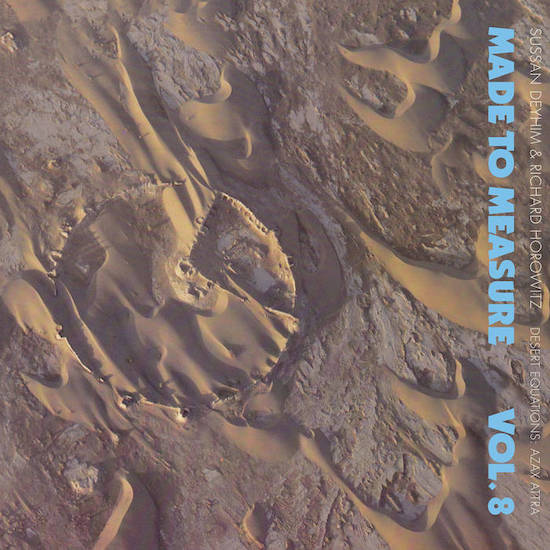When Desert Equations: Azax Attra was first released in 1986, it had little in the way of precedent. The impressive sonic array of its eight tracks are a result of the environment they were made in, and the shifting tectonic plates of culture and revolution. Much of its vitality is down to the impressive vocal prowess of Sussan Deyhim, who told me “the human voice is an astonishing landscape” when I interviewed her for Electronic Sound last year. Deyhim left her home in Iran in 1978 to take up a dancing scholarship in Brussels. Unable to return following the overthrow of the Shah in her home country, she took up residence in New York instead, where she met the composer Richard Horowitz in 1980.
Horowitz too, had lived a nomadic existence and had accrued some remarkable experiences along the way. He was part of the thriving East Village avant garde scene when he met Deyhim, alongside such contemporaries as John Cale, Le Monte Young and Ornette Coleman. He was about to begin collaborating with Jon Hassell, helping to conjure the spirit of ‘Fourth World’ techno-mysticism, and previous to that, he’d studied electronic music in Paris throughout the 70s. His formative adult years were spent in Tangiers, immersing himself in the indigenous sounds whilst hanging out with the Beats. He counted Paul Bowles as his mentor, while the ululating tapestry of ‘Desert Equations’ is dedicated to the then recently departed Brion Gysin, inventor of the Dream Machine and initiator of the literary cut-up method favoured by his pal William Burroughs. The lure of magic, ritual and the surprises of divination are as present here as they were in the life of Brion.
Desert Equations: Azax Attra is in a sense a product of its time, making use of incipient sampling technology, and yet – unlike many of the albums made with Fairlight CMIs – it still sounds futuristic. ‘Ishtar’ cuts up sounds and voice and hangs them together extraordinarily; ‘I’m a Man’ is more obviously from the mid-80s, and yet the bleating, bellicose vocals are too forthright and too uncanny to dismiss out of hand; ‘Azax Attra’ sounds both North African and of Norse mythology, an eerie and labyrinthine track where the listener becomes less surefooted the further they traverse it.
Crammed Discs originally released the album as the eighth instalment of their Made to Measure series, where musicians were encouraged to explore the outer reaches of their creativity, often in collaboration, as well as attaching the project to a soundtrack (spurious or otherwise) with a chosen work of art on the cover. Label boss Marc Hollander, already an advocate of pop in the avant garde and musical métissage, set up the series as an “alibi”, so that artists could dabble or experiment without the record being regarded as the all important “next album”. The series has been revived recently with artists like Aquaserge taking advantage of such impunity, exploring the these days recherché world of serialist composers on last year’s excellent The Possibility of a New Work for Aquaserge (Made to Measure Vol.46).
And so Desert Equations: Azax Attra gets re-released three and a half decades later, and it seems Hollander’s instincts were correct – the album is more in step with the neo-Dadaist art of our times than with the art that was made at the time (the very definition of avant garde). The internet has made appropriating sounds from the global community easy, though Deyhim and Horowitz were the global community, appropriating through lived experience.


